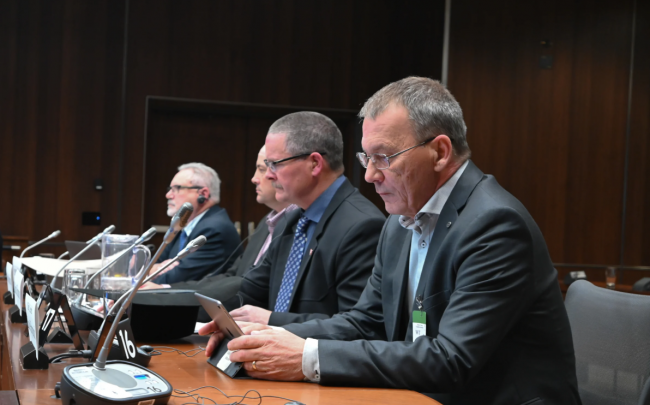Articles Menu

Feb. 21, 2025
A federal judge’s decision on a Quebec nuclear waste facility has set a new precedent for what consultation with First Nations should look like, raising the standard for projects across Canada.
On Wednesday, a judge ruled Canadian Nuclear Laboratories, the private consortium that manages the nuclear research facility in Chalk River Ontario, and the Canadian Nuclear Safety Commission did not meaningfully consult and receive the free, prior and informed consent of Kebaowek First Nation.
The decision is the first case that challenges the United Nations Declaration Act, or UNDA, which in 2021 made the United Nations Declaration on the Rights of Indigenous Peoples (UNDRIP) part of Canadian law.
Haymond, Kebaowek, and their leadership were ecstatic when they heard the news. The First Nations has launched petitions and legal challenges, lobbied the federal government and Quebec, and hosted press conferences in their fight to have their concerns heard on the project. Haymond says he is thankful for the support from the Bloc Quebecois, municipalities up and down the Ottawa River, environmental organizations and other civil society groups who supported Kebaowek in their campaigns.
“This is a win for Kebaowek, but it's really a win for everybody who believed that shortcuts were taken in this process regarding this project, and now we have a chance to go back and do a reset in terms of a proper consultation,” Haymond said.
Robert Janes, a lawyer for Kebaowek, said when UNDRIP was enshrined into Canadian law four years ago, there were many questions about how the law would play out. Many believed that UNDRIP would not be implemented immediately when the Governor General signed it into law. That is what Canadian Nuclear Laboratories lawyers argued in court — that the law’s prescription for First Nations consent would come into effect after regulations were finalized, which has not yet happened.
But Kebaowek’s legal team argued that “UNDRIP matters today.”
“That's a critical issue because many government agencies, decision-makers and proponents have been trying to put off the day when they'll have to face the higher standards that UNDRIP imposes,” Janes said.
There was also the elephant in the room for many Indigenous nations: whether UNDRIP would have teeth in Canadian courts or be another symbolic gesture.
“This is a win for Kebaowek, but it's really a win for everybody who believed that shortcuts were taken in this process regarding this project, and now we have a chance to go back and do a reset in terms of a proper consultation,” Haymond said. Blue Sky
There were worries that UNDRIP would not have teeth after a British Columbia judge ruled that the province’s Declaration on the Rights of Indigenous Peoples Act, which enshrined UNDRIP into provincial law, had no bearing on the province’s free-entry mining regime and instead was only an interpretive aid.
Now, there is an answer for UNDRIP at the federal level. With the courts siding with a higher bar for consultation, “the decision is far-reaching,” Janes said of Kebaowek First Nation v. Canadian Nuclear Laboratories.
In her decision, Judge Julie Blackhawk ruled that Canadian Nuclear Laboratories and the Canadian Nuclear Safety Commission must renew the consultation process with Kebaowek. The new consultations must uphold a view to implementing UNDRIP by “adapting its process to address Indigenous Law, knowledge and processes to develop a process that is aimed at reaching an agreement.”
Chief Lance Haymond and his team have campaigned, including launching an Algonquin-led environmental assessment to address key habitats for black bears and the endangered grey wolf. Haymond says the assessment was never incorporated into the final decision or the project.
“Judge Blackhawk indicated they had a legal obligation to apply UNDRIP in terms of the decision, and they failed to do so,” Haymond said. “So the judgment is, we must go back and correct those errors.”
It remains to be seen how the renewed consultation process between Kebaowek and Canadian Nuclear Laboratories will be developed. Janes said the government has provided little guidance on what free, prior and informed consent, one of the pivotal parts of UNDRIP, means for consultations with Indigenous nations in Canada. The situation has left a “tall order” for the Canadian Nuclear Safety Commission and Canadian Nuclear Laboratories, who will be the first proponents to consult with a First Nation under the legal weight of UNDRIP.
“Governments have largely just left it to the courts to figure it out,” Janes said on consultation and the bar for free, prior and informed consent. “It's really not the best way to be doing things.”
In a statement to Canada’s National Observer, the Nuclear Safety Commission said it is carefully reviewing the decision and will work with Kebaowek to “further implement” UNDRIP and ensure the project has the First Nation’s free, prior and informed consent.
“We remain committed to our responsibilities under the UNDA and to continuous improvement,” the statement read.
Canadian Nuclear Laboratories said in a separate statement it respects the decision and is taking the time to review it and determine the next steps.
Janes said the decision, due to its national importance in testing UNDRIP, can likely be appealed to the Supreme Court. But first, it will have to be challenged at the Federal Court of Appeal.
Kebaowek also has two outstanding legal challenges against the project: the first concerns the Species at Risk Act, and the second is another judicial review.
[Top photo: Lance Haymond, chief of Kebaowek First Nation, prepares to speak at a House committee about a nuclear waste facility near the Ottawa River on March 21, 2024. Haymond told Canada's National Observer that he is ecstatic by the decision, thanking all the support Kebaowek has received from allies during their campaign for a greater voice over a proposed nuclear waste facility on their territory. Photo by Matteo Cimellaro / Canada's National Observer]